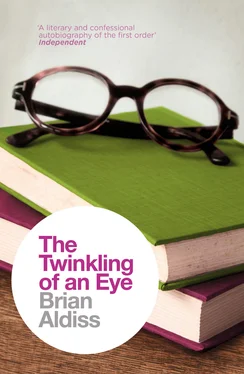Now it can be seen that the building is actually a ruin, the tower alone remaining intact. The body and roof of the church have collapsed, leaving only one wall standing – the long wall I saw as I approached. Using the fallen stone, persons unknown have constructed a humble dwelling – a cottage which utilises the remaining wall as its rear wall. The couple live in this subordinate lay building.
They welcome me into the cottage. I am weary and untrusting.
As the cottage door swings open, I see within a bright fire burning, and an aspect of homeliness.
Before I can cross the threshold, I wake up.
The dream is full of dreamlight – the light that never was on land or sea.
So impressed was I by this dream, and its vividness, that I painted the scene. It remained clear in every detail. So delighted was Dot with this painting that she showed it to all and sundry. I painted or crayoned the scene several times. It held apotropaic power. At one crisis of my later life, when I was leaving my children, I painted the scene again, and gave it to them, hoping it might bring them comfort too.
Such a special dream, a ‘lifetime dream’, such as many people have experienced, is open to many interpretations. There is no definitive interpretation, is not meant to be. On that first occasion, the dream radiated consolation. Later, it was open to more sophisticated reading. Nowadays, I see it as a prodromic dream, the dream of one who has a long way to go …
The paths of our lives cross and recross. At West Buckland School, there hung in the dining hall a framed reproduction of Hobbema’s ‘The Avenue’ (properly titled ‘The Avenue at Middelharnis’, painted in 1689). All we see is an ugly road, with lopped trees and flat banal scenery, but what a cross-referencing of reflection it awoke in me.
Later, in a print shop, I happened on one of Piranesi’s ‘Vedute’, his imposing views of Rome. It depicts the mausoleum of Helena, mother of Constantine, in ruined splendour. From its fallen stones, citizens of a later generation have constructed a humble villa. The villa stands within the embrace of the grander structure. Nightshirts hang on a washing line suspended from one of the windows. Here was my church again, in a more pretentious interpretation.
So paths of our inner lives cross and recross. And we have to recognise that though they may be magical for us, to others they will seem as banal and blank as Hobbema’s avenue. While writing of my own long avenues through life, awareness prompts that others have trodden them, others will tread them. Such is common human experience. It is common too, to wish to record the feelings that went with the events, just as we may suppose the Dutch artist in the seventeenth century was moved by the very ordinariness of his avenue.
In those early years, vivid dreams choked my sleep. I like to fancy they were the footfalls of a strong psyche coming into being, welcome even when rigged with alarm.
One Blakeian dream is mentioned in Bury My Heart . It is all light and flux, grand, impossible, implacable, the dream of a terrible thing in robes and fires advancing down our long corridor to where I remain helpless behind a closed door. The personage comes to seize me! He advances at infinite speed. Yet the corridor is also infinitely long. So, as in Zeno’s paradox, he is always arriving, never getting there.
This dream occurred more than once, perhaps between the ages of four and seven, then not again.
One interpretation is that this was a dream about being born, the long wait in the womb revisited, with intimations of movement about to become actual. A reading that fits more comfortably with my current preoccupations is that the foetus, as we know, recapitulates in its growth the phylogenetic history of our kind; so the time must dawn, at about the thirtieth week of gestation, when the assembling foetal brain gains sufficient complexity to generate a measure of consciousness – much as must have occurred at some period to our proto-humans as they gazed across their Pleistocene landscapes.
In that moment of profound shock, a man could look about him and realise he was, however little he desired it, a thing apart from his environment and from his mate. An individual.
This realisation – which I suppose marks the birth of Homo sapiens – finds its echo in the womb. We can hardly be surprised if a necessary acclimatisation to this puissant knowledge still takes place in dreams after birth, since dreams are a mode of communication with ourselves, and less subject to the foreshortenings of time as experienced by our waking selves.
I must not choke this book with dreams and imaginings, as humanity has choked its world with dreams and imaginings. When we, or our representatives, arrive on Mars, to walk those desolate distances in their spacesuits, they will find themselves on a globe empty of gods and demons – and will then proceed to cram it full with them. The shadowy Martian sunlight will surely encourage strange states of being, and phantasms.
Whether we shall then terraform the Red Planet, as many SF writers predict, to fill it with polytechnics and politics, remains to be seen. Perhaps Mars might be allowed to remain swathed in its own solitudes, an astronomical Ayers Rock, to be visited for meditation or honeymoon. And other harmless purposes.
So to that ominous spring of 1931.
The world’s economies are in a rocky state; later in the year, Britain will abandon the gold standard. Dot becomes more passive. Our evening prayers intensify. This time, this time , please let it be a girl …
A cot is brought over from Gordon’s furnishing department and rigged up as for a girl, with pink ribbons.
More and more of my time after school is spent among our maids.
Our maids are always of interest and sometimes of discomfort. Behind the respectable façade of church-going Dereham lurk many strange things. People sprout lions’ heads.
Our cleaning lady is a Mrs Rushden. She hails from Baxter Row, an old part of town, considered by all at Cowper Congregational Church as a Tobacco Row. Mrs Rushden is a dignified woman with a sharp face and sharp tongue. She has two children. Her motto, often quoted by Dot, is Nothing’s a trouble for the stomach .
She announces to Dot, early in their acquaintance, that she is not a washerwoman. She is a lady wot obliges people . Another one for the repertoire.
In later years, when Dot is older and wiser and we can discuss sex, she tells me that the father of all Mrs Rushden’s children is in fact Mrs Rushden’s father. ‘That’s Baxter Row for you,’ she says.
Much younger is Abigail. Perhaps she is only sixteen, teetering on the verge of middle age. She is pale, blue-eyed, of scrubbed appearance. She is the maid on whose privacy in her lavatory I intruded. I am curious about her in a way I cannot articulate. Possibly this is reflected in her attitude to me. She takes me out for walks. Something between us makes me edgy, part attracted, part repelled.
It is hard to tell whether she likes or hates me. I am Master Brian to her, keeping me at a distance, yet there is … whatever it was. Something like an unwilling conspiracy which neither of us needed.
Relationships are usually subject to development. Sometimes, though, they seem to exist beforehand, snapping full-grown into being when a pair meets. Only a glance is needed. It is this kind of decision, made without intellect, that leads people to believe in Fate. You may prefer genetics; an inexplicable thing still remains between people, luring us on.
One day, Abigail takes me for a walk and directs our footsteps towards her home in Baxter Row. I am reluctant. The row is very narrow. We enter a small house. I am unsure whether it is Abigail’s home or someone else’s.
Читать дальше












